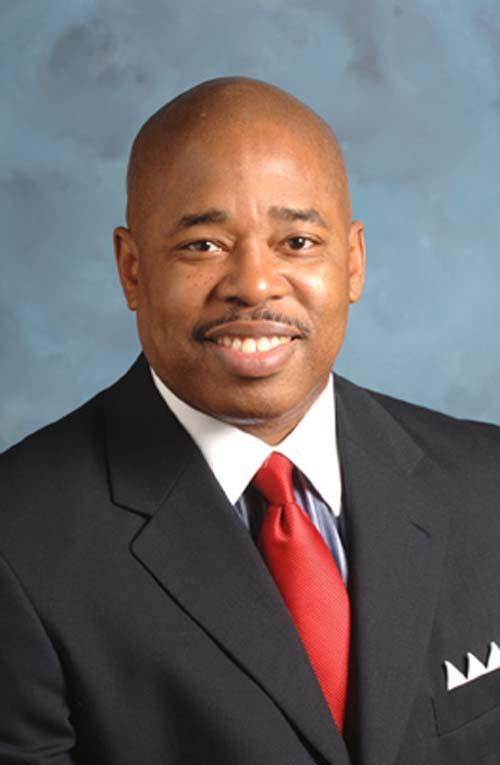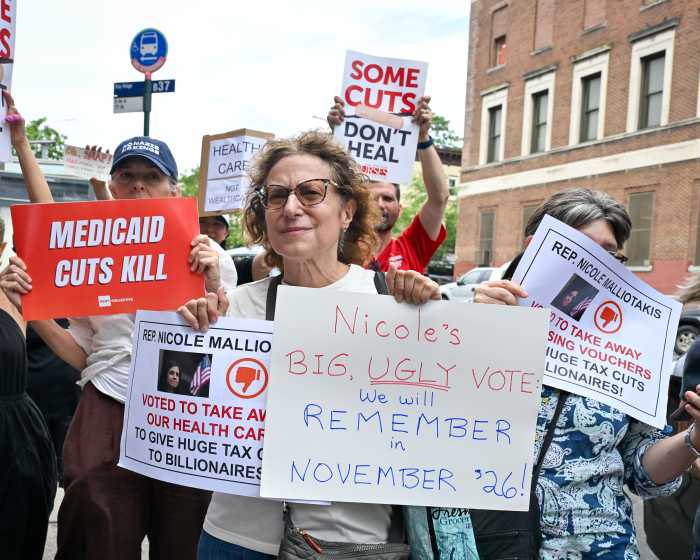When it comes to drafting legislation in Albany, some Brooklyn lawmakers are eager bill writers.
Others are not so prolific.
So say members of the New York Public Interest Research Group (NYPIRG), who recently announced that Brooklyn’s Albany legislators filed anywhere from 420 bills to just four pieces of legislation in the 2007-2008 legislative session.
By far the busiest Brooklyn bill writer was State Senator Carl Kruger, who drafted 420 bills. Out of that number, just eight of them ended up on the governor’s desk, NYPIRG officials report.
The Brooklyn state legislator who put in the fewest number of bills was Brighton Beach Assemblymember Alec Brook-Krasny, who introduced four bills during the last legislative session.
The only Brooklyn state legislator to put in fewer bills than Brook-Krasny was East New York Assemblymember Diane Gordon, who spent most of last year on trial for bribery – charges that ultimately sent her to prison. Still, despite all of her legal challenges, Gordon managed to introduce two pieces of legislation, according to the NYPIRG study.
Following Kruger, the second most prolific borough state legislator was Dyker Heights Assemblymember Peter Abbate, who introduced 278 bills – 43 of which ultimately made it to the governor’s desk.
Abbate was followed by Bay Ridge State Senator Marty Golden and Sunset Park Assemblymember Felix Ortiz (239 bills apiece) and Williamsburg Assemblymember and Kings County Democratic Party Chair Vito Lopez (175 bills).
Legislators who put in fewer than 20 bills in the 2007-2008 legislative session included Marine Park Assemblymember Alan Maisel (18 bills) Bay Ridge Assemblymember Janele Hyer-Spencer and Crown Heights Assemblyman Karim Camara (17 bills apiece) and Borough Park Assemblymember Dov Hikind (seven bills).
Both Kruger and Abbate said that many of the bills they introduced were either connected to the high-profile committees they chair (Social Services Committee for Kruger, the Committee on Government Employees for Abbate). Some of the bills were re-submitted, after they failed to gain momentum in previous years, they said.
“I’m sort of a senior guy around here [the State Senate] so I have about 15 years worth of assorted bills that I re-file because they never passed in previous years,” Kruger explained. “Many other are ideas that come to me from the community. We all have better ways to building a better mouse trap. I just put them in bill form.”
One of Kruger’s recent “ideas” – probably the one he received the most press about – involved introducing legislation requiring iPod and MP3 listeners to shot off their music players when crossing the street. The theory was that there would be fewer pedestrian accidents if people paid more attention to their surroundings.
Even though the legislation never got out of committee, Kruger said he believed it was successful because it “got people talking.”
“It may have been an over-the-top idea, but it’s becoming a stable approach to dealing with the problem,” he said. “Many people lost their lives or were maimed because they were wired to outer space.”
Abbate said that the legislators with more years in Albany – and more staff members – usually produce more bills.
“Freshman assemblymembers don’t have a lot of staff,” he said. “In my first couple of years I would put out about eight or nine bills a year. As the years went on, I got more and more staff members to help me research and write more bills.”
When contacted, some legislators said they tend to focus on priorities other than drafting legislation.
“We’re a full-service constituent office,” said a spokesperson for Carroll Gardens Assemblymember Joan Millman, who introduced 48 bills in the last legislative session. “Still, given our size and staffing, we still write quite a lot of bills.”
Kruger and Abbate said that they, too, have “full-service constituent offices” and do not utilize all of their time drafting legislation.
Abbate said that he has two legislative offices in his district, which handle complaints from thousands of people each year.
When contacted Thursday, Kruger said he serviced 284 constituents that morning.
“It was flu shot day at the house of Kruger,” he said. “That’s about as grassroots as it gets.”
“Working up in Albany is just a piece of the work,” he said. “But you should be able to do everything. You can’t say one is more important than the other. You have to find a balance.”
Realizing that a legislator’s effectiveness is gauged by a host of different barometers, officials from NYPIRG said their study alone should not be used to make or break a lawmaker.
“It would be unfair if this was the sole measure of legislative effectiveness,” explained Blair Horner, NYPIRG’s legislative director. “Some bills are meaningful, while others aren’t. A bill was passed this year to designate a state muffin. Is that as important a proposal as financial aid to college students?”
“The numbers of bills themselves are only one minor aspect of a legislator’s efficiency,” he said, adding that their study was designed to “allow voters to ask more informed questions of their legislators.”
Calls to both Brook-Krasny and Hikind were not returned as this paper went to press.























